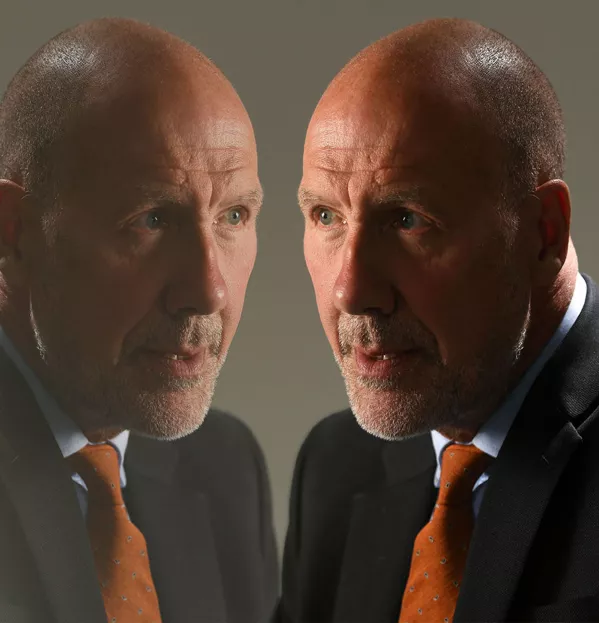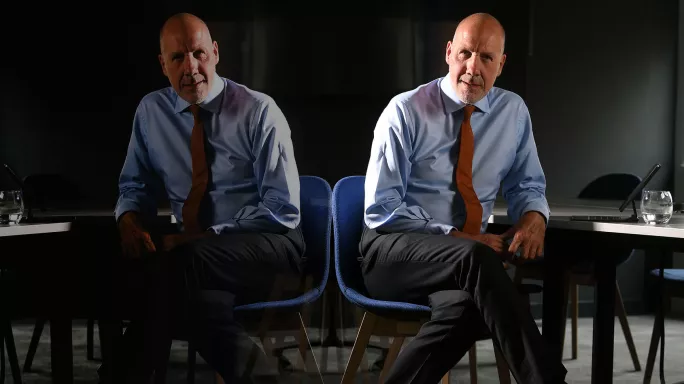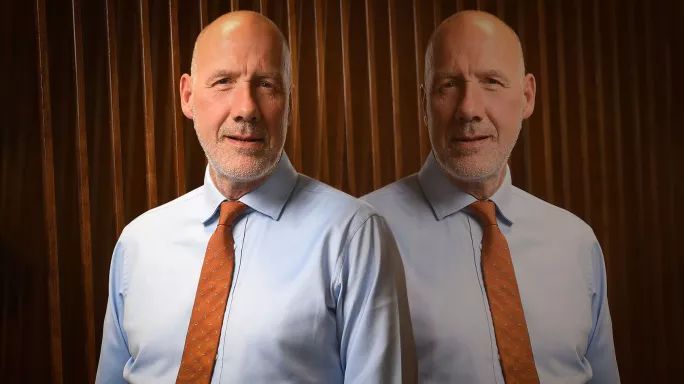The two sides of Geoff Barton

Geoff Barton tells me that, as an A-level student, he was banished from his sixth-form common room for two years - for refusing to pay 50p towards snacks.
“I told them: ‘I think state education should be free.’”
“That was principled of you,” I suggest.
“Or horribly pompous,” he fires back.
It’s the type of response that those who have spent time with Barton will recognise: he is extremely anxious about coming across as arrogant or pretentious, and finds praise uncomfortable.
At a recent House of Commons bash held to mark his departure as general secretary of the Association of School and College Leaders after seven years, he says he struggled to maintain a “fixed rictus grin” as senior figures showered him with plaudits.
That’s something he has had to become well-practised at: many have been eager to acknowledge Barton’s achievements as a union leader - particularly his efforts throughout the pandemic and in last year’s fraught pay talks, during which he was widely seen as having stood up for the profession without alienating parents or government officials.
The ‘wisdom’ of Geoff Barton
He was recently praised for his insight and “wisdom” by both the education secretary and her shadow counterpart at the union’s annual conference. And now he is chairing a commission on oracy, which had its first meeting this week and will almost certainly feed into the education policy of the next government.
Barton should be content, confident, assured of his place in the sector. And to most, he appears that way. There are his ubiquitous broadcast appearances where he is supremely comfortable on camera, and there’s his cheesy “Geoffy B” DJ alter ego, whose megamixes will be familiar to many in education: the latest version came with an image of him portraying The Greatest Showman.
- New role: Outgoing union boss Geoff Barton to chair oracy commission
- How I Lead: “You have to let people screw up,” says Geoff Barton
- Geoff Barton: Why time for pupil volunteering is always worthwhile
Add to this his book reviews (“Barton’s bookshelf”) and busy social media feed - often featuring pictures of big Suffolk skies taken while walking the family’s Border terrier, Molly B - Barton is a strong presence in education, with a distinctive personal brand.
But he says he maintains a “lingering sense of not being one of the complete insiders in the education mafioso”. Why is this, I ask, when we meet in a central London hotel.
He trains his eyes on the neat pile of crustless sandwiches in front of him.
“I’ve always had impostor syndrome,” he admits. “Part of me wants to look over my shoulder and ask, ‘Who are they talking about?’”
It’s an interesting question. The public persona of Barton contrasts so sharply with how he is off-stage and off-camera, yet the two versions somehow co-exist. So as as he embarks on his next educational role, which Geoff Barton is the real one?
Barton says the confident version of himself that most people see is his “public face”. While his critics could dismiss his vulnerable moments as merely an “affectation”, “it really is not”, he insists, adding that many would be “surprised” at how much “gnawing insecurity” he experiences.
Those he knows well say they see the latter frequently. And if you spend a period of time with him, you begin to see it, too.
For example, during our interview, he runs through a remarkably detailed critique of three different leaving speeches he has made in the past week. One, to regional staff, did not quite make the grade. “It was too pompous, it needed a bit more humour.” The second speech was more “scurrilous” and had a better reception. The third just about “worked”.
“I’m my own biggest critic. I don’t need loads of people to tell me, ‘Geoff, that was wonderful,’ particularly if I know it wasn’t,” he says.

He was not always like this. At Walton Comprehensive, a “lippy” teenage Barton enjoyed testing teachers’ weaknesses.
“I was arrogant,” he sighs. “My friend Glenn said to me, ‘You know what your problem is? You’ve got a superiority complex.’”
He pauses to enjoy the rhetorical playfulness of the phrase.
Barton had been bored by the school curriculum, and was more interested in becoming a DJ - purely for his beloved jingles, not the music. This made for a less than exemplary academic record.
“I got my O-level results and took them home and showed them to my mother, who said: ‘Failure.’ Talk about a woman of few words.”
After he drifted into sixth form, an unlikely narrative arc resulted in him becoming a “strict” English teacher and then headteacher.
“I used to think if I walked into a classroom and the kids didn’t sharpen up a little bit, make sure their ties were done up right, then I’d lost my touch,” he says.
“I could never sleep on a Sunday night because I was worried about what the week ahead would look like”
But Barton had begun to shift away from the super-confident person many still see him as today. His anxiety ramped up to almost “debilitating” levels during his time as a school head.
“I could never sleep on a Sunday night because I was worried about what the week ahead would look like,” he says. “The longer I did headship, the bigger that gulf between the Sunday and the Monday became.”
Becoming general secretary of the ASCL in a landslide electoral victory in 2017 against the union’s preferred candidate could have offered release, but instead Barton became even more hypercritical.
Before every TV or radio appearance - which on some days must have amounted to hours of footage - he tipped off a friend and former colleague, who would later give him written feedback. He also watched himself back “relentlessly” to check how he could have got his message across better.
Rather than this “obsessive self-analysis” being destructive, Barton used - and uses - it to hone his craft and draw on the public speaking methods that he once taught as his school’s debating team coach.
“I use a lot of very obvious techniques in the way I speak and frame things - it’s terribly mannered really,” he admits.
Over the years he has learned to explain educational lingo more clearly, and to phrase arguments from a parent’s perspective.
“I would not say, ‘Government needs to understand.’ I would say, ‘I think many parents would say that the government needs to…’,” he explains.
‘A reasonable voice’
That has given him, and the ASCL, a voice that “speaks beyond the profession”, he believes.
Many in the sector agree. They argue that, in his years leading the union, Barton has brought a level of calm authority to debates that could otherwise have pitched parents against schools, on issues from face masks to teacher pay.
Colleagues say his efforts to “campaign with a reasonable voice” came in handy during drawn-out negotiations with Department for Education officials over last year’s pay deal - “a frustrating little dance”, as Barton describes it, that ended with a 6.5 per cent rise for teachers after a wave of strikes, which very nearly included headteachers.
“I think we will have surprised people in the room who were expecting us to play the union barons role, because we didn’t - we were very calm and collected,” he says.
There were points of difference not just with civil servants but between the teaching and leader unions, whose policies sometimes clash on areas like performance-related pay.
“We injected a discipline whereby if there were points of dispute, we would thrash that out behind the scenes,” says Barton.
Alongside those pay talks, Barton again aimed to court the world beyond the “echo chamber of education” by linking teacher pay to the shortage of specialist subject teachers in TV interviews.
“I was able to say, ‘One in eight maths lessons are being taught by people who do not study it themselves beyond GCSE. Parents must think that this is a scandal.’ I was trying to cut through to them as well.”

Privately, this all took a toll. Not just the cycles of self-criticism that led to the carefully honed messages, but the long rounds of media interviews, sometimes stretching from 7am until late. Barton says this led to an “inability to switch off”.
Is that why he stepped down from the ASCL role three years before his second term was officially up?
He says staying the full term was never his plan.
“I’ve always felt, in any job, the first phase is trying to be able to do the job. The second phase is then doing the reforms that are necessary. And the third one is a legacy one - passing the organisation on in a better shape than you got it. And that didn’t need another five years.”
His successor as general secretary, Pepe Di’Iasio, “will refresh and rejuvenate and re-energise in a way that I wouldn’t”, he adds.
Speaking up for oracy
Barton’s focus now is on chairing The Commission on the Future of Oracy Education in England, hosted by national oracy charity Voice 21. Will the self-critical side of his personality get a rest?
It sounds unlikely. All leaders have a private and public face, and the defining feature of anyone in a big public role, including in the private sector, is “paranoia”, Barton says, drawing on insight gained from executive coaching sessions.
All the self-doubt has improved his public performances, and being open about it helps to reassure others that it is perfectly normal, he feels.
And, despite some apprehension about never chairing a commission before, he is clearly excited about going back to his “roots”: oracy is a subject close to his heart.
Barton has been recording interviews with commissioners, including curriculum expert Christine Counsell, and the group plans to produce a set of “five very specific” policy proposals ahead of the general election.
The subject has been getting something of a battering on social media, but this is a debate Barton is more than prepared to lean into.
“There are people who are real critics of oracy as a concept. I want them [to contribute] as well,” he says.
The argument that oracy is a patronising, middle-class idea that denigrates working-class voices and fails to address the causes of poverty is, he argues, “a terrible caricature”.
“In my world,” he says, “we can acknowledge there is a thing called poverty, which needs addressing. But we can also talk about oracy, at the same time. What we all do is change our spoken language according to context. Routinely, we do that. Let’s help everyone to understand how that works.”
“Oracy is one of the ways we might get some joy back into being a teacher”
He also wants the commission’s work to feed into classroom practice, saying: “As somebody who used to walk around watching teachers teach, it always looked to me as if the difference between a superb teacher and an OK teacher was around the way they framed questions.”
Superb teachers “asked fewer questions, better questions”, giving young people time to listen and build their responses, “rather than just quacking an immediate answer”, he adds.
“There’s a sense that [oracy] is one of the ways we might get some joy back into being a teacher and some joy of being a learner,” he expands.
Clearly, Barton will need all the skills he honed at the ASCL to steer the debate and get public opinion behind the subject.
Some argue he’ll also need the political skills he acquired, too. When it comes to making policy recommendations, the commission is likely to be preaching to the converted if, as expected, Labour comes to power in the next election, but there are still complexities.
The party has already said its planned curriculum and assessment review will explore how to weave oracy into lessons throughout school, and Voice 21 is co-founded by Peter Hyman, senior adviser to Labour leader SIr Keir Starmer.
Barton stresses that the commission is “not Peter’s baby” and that he has “never spoken to Keir Starmer”, but adds: “I’d be surprised if it didn’t feed into something, for whoever comes into power.”
What does the future hold?
What comes after the commission? Would he agree to lead Labour’s curriculum review, if asked?
He is saved by a crunch of guitar chords signalling that a live music performance has started somewhere in the room. Over the noise, he responds: “Nothing has made me think that they’re going to do that.”
Barton shrugs. After the commission he might want to “move to something else”.
What could that be? He rules out publishing any memoirs, but tantalisingly mentions a diary he kept of “interesting moments behind the scenes” of the teacher pay talks. Surely there would be a - possibly niche - readership for that?
“I think no. It would be demeaning, ultimately, for all of us.”
There is plenty he is still angry about that could provide a campaign focus if he did want to move to a new role following his oracy work. For example, that schools are being expected to hold together communities without adequate resources or the experts they need in mental health and social care. The teacher recruitment crisis also worries him, unsurprisingly.
“We don’t need to spook the profession by upending everything”
Then there’s the fact that he believes the curriculum and the qualification system feel “alien” to some young people who will never get their grade 4 in English and maths. And the special educational needs and disabilities system is “completely unsustainable”.
“It’s bad for parents and just puts them in this combative mode,” he says. “And it’s not working for those young people because you’re not giving them the dignity of achievement,” he adds, with a shoe-gazing soundtrack lending his words an extra layer of despair.
How optimistic is he that these problems will be addressed if Labour is elected? He feels shadow education secretary Bridget Phillipson is focusing on “the right things”, but warns: “We don’t need to spook the profession by upending everything.”
Plans “will need to be accompanied by a timeline” to avoid the impression that “on the first day everything’s going to be thrown into the air”, he says, pointing out that much of the detail in Labour’s plans - such as what could replace Ofsted grades and how schools would be supported for improvement - still needs to be worked through.
All this sounds like a man who still sees a role for himself at the top table of policy, but Barton suggests not - at least, not just yet. For now, he’s ready to focus on the other side of himself.
“I’m looking forward to just having processing time because I haven’t really had time to do that,” he says. And then he catches himself: “That sounds kind of pretentious…”
It is hard to imagine Geoff Barton retreating to the sidelines of education: from refusing to pay a 50p sub as a sixth-former, to almost leading the ASCL to its first national strike in 150 years, fighting hard for what he believes in seems hard-wired.
But once the oracy commission is over, he is determined to - at least for a while - retain enough headspace to let the lesser-known side of him breathe; to do some cooking and to learn to play the piano.
Which genre? Jazz? Classical?
“I might just write an international award-winning pop song in my first week,” he jests.
Look out for it on the next Geoffy B megamix.
For the latest education news and analysis delivered directly to your inbox every weekday morning, sign up to the Tes Daily newsletter
You need a Tes subscription to read this article
Subscribe now to read this article and get other subscriber-only content:
- Unlimited access to all Tes magazine content
- Exclusive subscriber-only stories
- Award-winning email newsletters
Already a subscriber? Log in
You need a subscription to read this article
Subscribe now to read this article and get other subscriber-only content, including:
- Unlimited access to all Tes magazine content
- Exclusive subscriber-only stories
- Award-winning email newsletters
topics in this article



